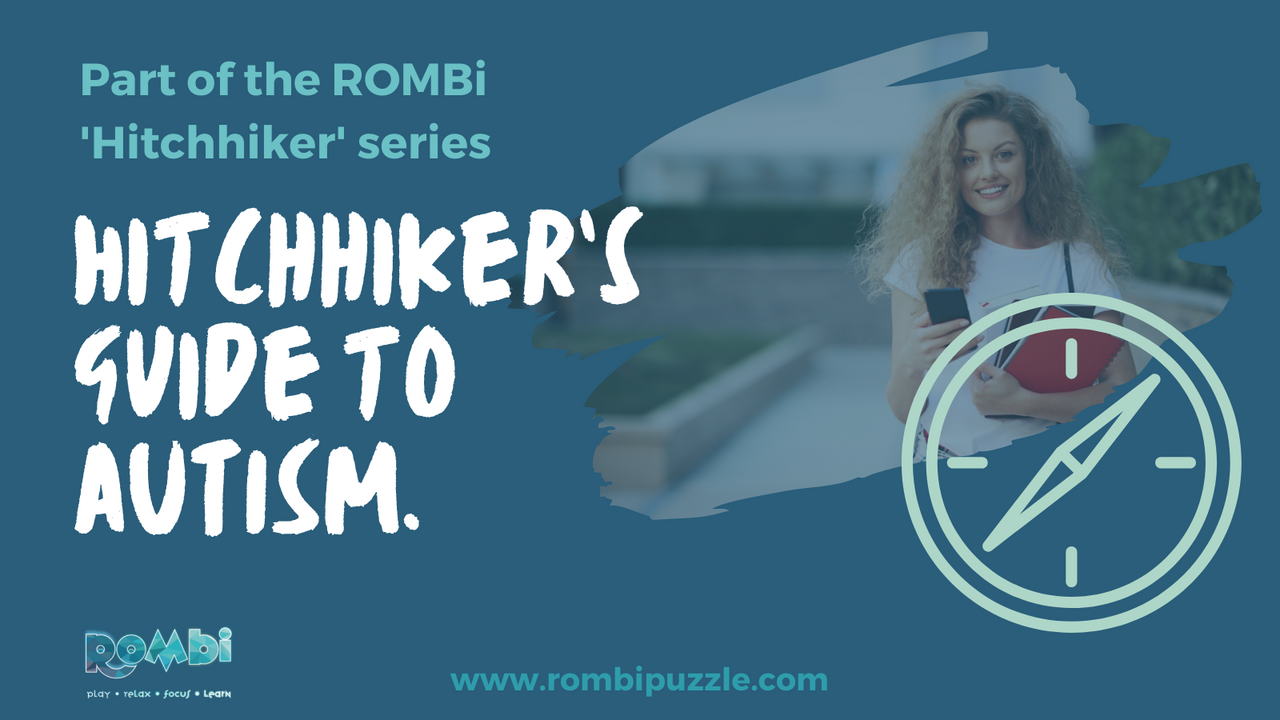The Autistic Society describes autism as “a lifelong developmental disability which affects how people communicate and interact with the world.” As part of this theme, we wanted to look at how an autistic individual sees the world and what advice we can offer that goes to the heart of how they are feeling.
We are delighted to be sharing this month’s Hitchhiker’s guide to Autism.
Autism Awareness
As part of Autism Acceptance month and our research we caught up with ROMBi founder and educational specialist, Penny Georgiou, to consider her response to a question from an autistic teenager.
The individual spoke of their ‘existential crisis with time and growing up’. Below is Penny’s advice that may be useful for anyone battling with time and questioning whether they may be too old for certain things:
“Much of what we think we know, especially when it is distressing, is based on misperception.
This is good news, as it gives us latitude to trust our process, to take our time step by step and explore how this vastness of potential relates to us; how it actualises, in particular, in each moment.
Noting the ‘I am’, and giving it its full gamut of letters may be another relevant starting point. It offers its function as our ‘home base’ in language, a discreet declaration and affirmation of being. Anything that we attach to that can be considered with care, if we are to find and work with the thread of our desire. It is our desire that carries the discrete knowing of what is relevant for us, as it moves in overtures of satisfaction. When we doubt, diminish or discredit the credibility of its (desire's) intelligence, we experience suffering, be it in moderate or acute terms.”
Throughout the pandemic many autistic children and adults have experienced significant distress. Anxiety, stress and crisis are just some of the words that we use to describe this distress. All these words imply that someone is experiencing something that they don’t understand and don’t know how to respond to. They feel that they have to solve it right now! An urgency of time is always implicit. This point of urgency can be almost as difficult for those trying to help as it is for the person concerned. As we ease up on worry, the urgency of the moment can allow us to define what is possible and what is necessary, offering us new ways to solutions.
Penny says that we can experiment, for example, using ‘I am desiring' as a starting point and then adding predicates and nouns to see how they feel…if they feel good, this indicates viable steps directions for us in this moment. If not, then maybe another time. For example; ‘I am desiring water to drink.’ Is the answer, Yes? Not now, maybe later?’
This can allow us to find new pathways for living life, which is always experienced as a renewable ‘now’. This appears to be so even when we are thinking about an event deemed a past or a future one.
How ROMBi can support autism
Penny’s research emphasizes the value of structured handplay for perceptual development of children and adults with and without autism.
The puzzle’s value is both in reducing historic issues and laying foundations for discovery, learning and wellbeing.
Daily structured handplay brings focus, clarity, structure, orientation and discernment to our localised thought processes. From there, individuals are better placed to clarify and decide for themselves step by step the direction they desire to explore further.
“It is worth noting that life often draws us incidentally into areas where we can discover our talents as they develop through our doing them. They are profoundly related to what gives us deep satisfaction albeit in subtle ways.”
Completing just one ROMBi puzzle a day improves:
Body awareness;
Harmonising in sensory processing;
Ability to distinguish between self and other’s awareness;
Spatial awareness and structure;
Organisational skills;
Language functions;
All of the above have implications for toileting and social skills;
Proportionality of threat level;
Maintaining a sense of place and identity while transiting between different perspectives.
Adults and children alike are taking to ROMBi to build organisation in their thoughts and increase their capabilities. It is also helping parents to manage life’s day to day logistics and see new solutions for longstanding problems.
National Autistic Society
The National Autistic Society has been the UK's leading charity for people on the autism spectrum and their families since 1962. Its website provides online advice and guidance, an Autism Services Directory and an online community for autistic people and their families to meet like-minded people and share their thoughts and experiences.
The society’s website is also home to a wealth of research including Dr Olga Bogdashina’s advice on sensory processing differences. The author, practitioner and lecturer gives her Top 5 Tips for managing sensory differences for autistic people.
Get Involved
If you are interested in finding out more about ROMBi, Penny’s research or how ROMBi can support you visit our product page here.
For more insights from Penny follow our social media accounts:
Facebook: https://www.facebook.com/ROMBiPuzzleGlobal
LinkedIn: https://www.linkedin.com/company/11487587/
Twitter: https://twitter.com/RombiPuzzle
Instagram: https://www.instagram.com/rombipuzzle/
Pinterest: https://www.pinterest.co.uk/RombiPuzzle


